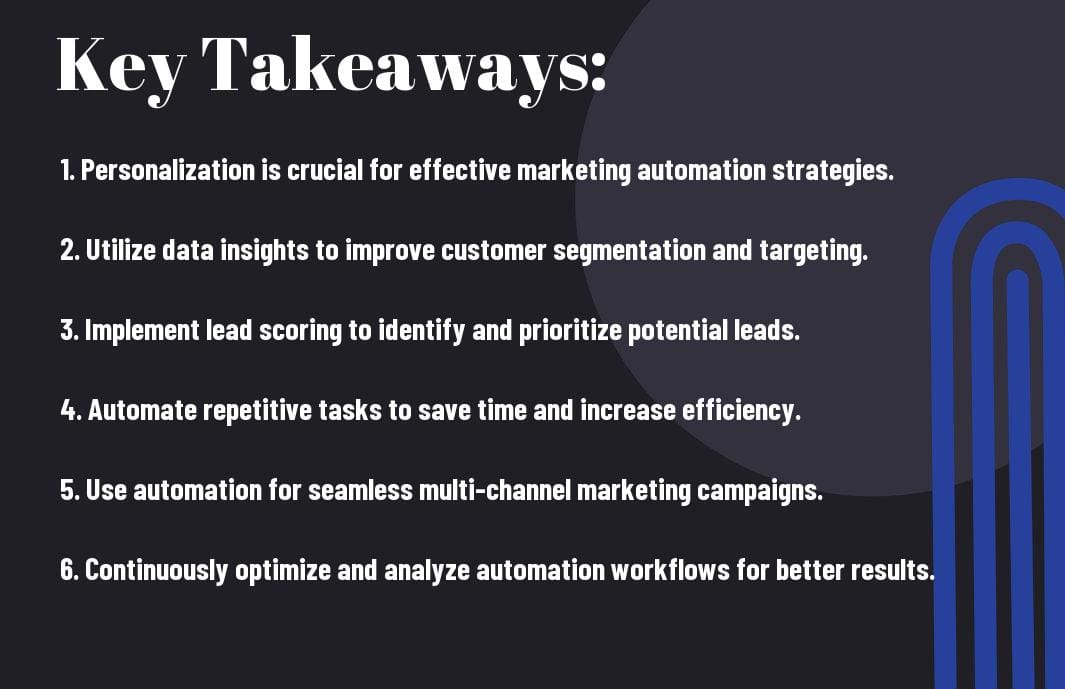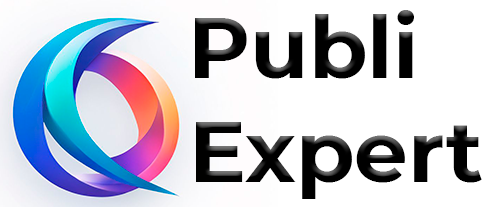Most businesses today are leveraging marketing automation to streamline their marketing efforts and drive better results. However, many companies may not be harnessing the full power and capabilities of this technology. Effective use of marketing automation can revolutionize your marketing strategies, increase efficiency, personalize customer interactions, and ultimately drive more sales. In this blog post, we will discuss the importance of fully utilizing marketing automation to maximize its benefits and propel your business to success.
Key Takeaways:
- Personalization is key: Utilize marketing automation to create personalized experiences for your customers based on their behavior, interests, and preferences.
- Segment your audience: Divide your audience into different segments based on demographics, behavior, or preferences to send targeted and relevant messages.
- Measure and analyze results: Use automation tools to track the performance of your campaigns, analyze data, and make data-driven decisions to optimize your marketing efforts.

Understanding Marketing Automation
Clearly, marketing automation has become a crucial tool for businesses looking to streamline their marketing efforts and drive better results. By leveraging technology to automate repetitive tasks, marketers can focus on more strategic initiatives and personalizing their communication with customers.
Defining Marketing Automation
To understand marketing automation, it is vital to recognize that it is a software platform that helps marketers automate, streamline, and measure marketing tasks and workflows. These tasks can include email marketing, social media posting, ad campaigns, lead nurturing, and more. The goal of marketing automation is to make marketing processes more efficient and effective, ultimately leading to increased revenue and a better customer experience.
Components of a Marketing Automation System
Defining the components of a marketing automation system is important to grasp the full potential of this technology. A marketing automation system typically includes tools for email marketing, lead management, website tracking, analytics, and campaign management. These components work together to automate repetitive tasks, segment audiences, personalize content, and track the performance of marketing campaigns.
A comprehensive marketing automation system can empower marketers to create highly targeted and personalized campaigns, improve lead nurturing efforts, and increase overall marketing ROI. By leveraging the capabilities of a marketing automation system, businesses can optimize their marketing efforts and drive growth in a scalable and efficient manner.
Integrating Marketing Automation into Your Strategy
Aligning Your Marketing Goals with Automation
Strategy is key when it comes to integrating marketing automation into your overall plan. Before stepping into the world of automation, it’s crucial to align your marketing goals with what this technology can achieve. By setting clear objectives and KPIs (Key Performance Indicators), you can ensure that your automation efforts are targeted towards driving results that matter to your business. Whether your goal is to increase lead generation, improve customer engagement, or boost sales conversions, having a laser-sharp focus will enable you to make the most of your automation tools.
Building a Marketing Automation Plan
Your marketing automation plan is the roadmap that will guide your efforts towards success. It involves mapping out the customer journey, identifying touchpoints, and creating personalized workflows that cater to different segments of your audience. By segmenting your audience based on behavior, demographics, or other criteria, you can deliver relevant content at the right time, increasing the chances of conversion. Additionally, by setting up triggers and actions, you can automate responses to specific customer interactions, streamlining your marketing processes and saving time.
With a well-thought-out marketing automation plan in place, you can nurture leads more effectively, drive engagement, and ultimately, boost your ROI.
Marketing Automation Features You Should Be Using
Unlike traditional marketing methods, marketing automation offers a wide range of features that can help businesses streamline their marketing efforts and boost efficiency. If you want to stay ahead in the highly competitive digital landscape, it’s crucial to leverage the full potential of marketing automation tools. To explore deeper into this topic, check out The future of Marketing is Automation | by Kelly Mirabella for insights on how automation is shaping the future of marketing.
Advanced Email Marketing Campaigns
To create more impactful email marketing campaigns, incorporate advanced features such as dynamic content and personalized messaging. Utilizing these tools can significantly boost engagement and conversion rates. Here are some key elements to focus on:
| Dynamic Content | Personalized Messaging |
| Deliver tailored content based on user behavior. | Address subscribers by name and tailor messages based on preferences. |
Lead Scoring and Nurturing
Scoring leads allows you to prioritize and allocate resources more effectively, leading to higher conversion rates and enhanced customer relationships. Nurturing leads through targeted content and communication helps guide them through the sales funnel, increasing the likelihood of conversions. It’s vital to:
It is crucial to set up a lead scoring system that assigns points based on prospect interactions. By nurturing leads with relevant content and timely follow-ups, you can move them closer to making a purchase decision.
Segmentation and Personalization
One of the key benefits of marketing automation is the ability to segment your audience based on various criteria and deliver personalized content to each group. By tailoring your messaging to specific segments, you can improve engagement and drive conversions.
Should you want to further enhance your segmentation and personalization efforts, consider implementing tools that allow for more granular audience segmentation and dynamic content customization. This level of personalization can significantly increase the effectiveness of your marketing campaigns.
Multi-Channel Marketing Coordination
The integration of multiple marketing channels, such as email, social media, and SMS, allows for a cohesive and consistent customer experience. By coordinating your campaigns across various channels, you can ensure that your messaging reaches the right audience at the right time, maximizing impact and engagement.
The Features of marketing automation provide businesses with powerful tools to streamline their marketing efforts and drive better results. Leveraging these advanced features can help you stay ahead of the competition and build stronger relationships with your audience. By incorporating features like dynamic content, personalized messaging, lead scoring, segmentation, and multi-channel coordination, you can take your marketing efforts to the next level.
Analyzing and Improving Your Marketing Automation
Key Performance Indicators (KPIs) to Monitor
Keep a close eye on the key performance indicators (KPIs) of your marketing automation campaigns to ensure they are on track to meet your goals. Important KPIs to monitor include conversion rates, click-through rates, open rates, and overall engagement metrics. By tracking these KPIs regularly, you can identify areas that need improvement and make data-driven decisions to optimize your campaigns for better results.
Utilizing A/B Testing for Optimization
Your marketing automation strategy can greatly benefit from A/B testing to optimize your campaigns. By testing different variations of your emails, landing pages, and other content, you can determine what resonates best with your audience and drives the most conversions. This iterative process allows you to continuously improve your campaigns based on real data and insights, leading to more effective and targeted marketing efforts.
With A/B testing, you can experiment with elements such as subject lines, call-to-action buttons, images, and messaging to see which combinations yield the best results. It is important to run these tests consistently and analyze the data thoroughly to make informed decisions on how to refine your marketing automation strategy for maximum impact.
Analyzing The Importance of Regular Audits and Updates
Regular audits and updates of your marketing automation processes are crucial to ensuring they remain effective and aligned with your business objectives. By conducting regular audits, you can identify any issues or inefficiencies in your workflows, data management, or campaign performance. This allows you to make necessary adjustments and optimizations to enhance the overall performance of your marketing automation efforts.
Monitoring and maintaining your marketing automation platform is an ongoing process that requires attention to detail and a commitment to continuous improvement. By staying proactive in assessing and updating your automation processes, you can stay ahead of the curve and drive better results for your business.
Leveraging Marketing Automation for Customer Retention
Now more than ever, businesses are focusing on retaining existing customers rather than solely acquiring new ones. Marketing automation plays a crucial role in this strategy, helping companies effectively engage with their customers and keep them coming back for more. By leveraging marketing automation for customer retention, businesses can build long-lasting relationships, increase customer loyalty, and ultimately drive revenue growth.
Strategies for Boosting Customer Loyalty
Retention Strategies for boosting customer loyalty through marketing automation include personalized communication, targeted promotions, and loyalty programs. Utilizing automation tools to send personalized messages based on customer preferences and behavior can significantly enhance the customer experience and strengthen brand loyalty. By segmenting customers and tailoring content to their specific needs and interests, businesses can create a more meaningful connection with their audience.
Creating Personalized Customer Journeys
Creating Personalizing customer journeys through marketing automation involves mapping out the customer lifecycle and delivering relevant content at each stage. By analyzing customer data and behavior, businesses can create automated workflows that guide customers through a personalized journey. This tailored approach not only increases engagement but also improves the overall customer experience, driving loyalty and retention.
Another important aspect of creating personalized customer journeys is leveraging dynamic content and personalization techniques to deliver the right message to the right customer at the right time. By tailoring content based on customer preferences, browsing history, and interactions with the brand, businesses can create a more personalized and engaging experience that resonates with their audience.
Overcoming Common Marketing Automation Challenges
Avoiding Automation Overload
Many marketers fall into the trap of automating every aspect of their marketing strategy, leading to overload and diminishing returns. It’s crucial to strike a balance between automated campaigns and manual touchpoints to ensure that your messaging remains personalized and engaging.
Maintaining a Balance Between Automation and Human Touch
On the other hand, relying too heavily on manual processes can be inefficient and time-consuming. Maintaining a balance between automation and the human touch is necessary to create a seamless and personalized experience for your audience. Utilize automation for repetitive tasks and use human interaction for more complex inquiries or personalized communication.
Avoiding the pitfalls of both extremes can help you optimize your marketing automation efforts and drive better results for your business.
Preparing for the Future of Marketing Automation
After Top marketing automation statistics for 2022, businesses need to prepare for the future of marketing automation. Staying ahead of emerging technologies is crucial to maintaining a competitive edge. With advancements in artificial intelligence, machine learning, and predictive analytics, marketers can leverage these tools to personalize customer experiences at scale.
Staying Ahead of Emerging Technologies
For businesses to stay competitive, they must embrace emerging technologies that drive marketing automation forward. By investing in AI-powered tools, marketers can analyze vast amounts of data to deliver hyper-personalized messaging and anticipate customer needs. Machine learning algorithms can help optimize marketing campaigns in real-time, while predictive analytics can forecast consumer behavior patterns, allowing for proactive and targeted marketing strategies.
Adapting to Changing Consumer Behaviors
The evolution of marketing automation also involves adapting to changing consumer behaviors. As technology continues to shape how people interact with brands, marketers need to understand and respond to these shifts. Today’s consumers expect seamless omnichannel experiences, personalized recommendations, and instant gratification. By leveraging marketing automation tools, businesses can tailor their messaging to meet these expectations and build lasting relationships with their customers.
Another important aspect of adapting to changing consumer behaviors is the need to prioritize data privacy and security. As consumers become more conscious of how their data is being used, businesses must be transparent about their data practices and ensure compliance with regulations such as the GDPR and CCPA. By building trust through responsible data handling, companies can differentiate themselves in a competitive marketplace and foster loyalty among their customer base.
FAQ
Q: What is marketing automation?
A: Marketing automation is a technology that allows companies to streamline, automate, and measure marketing tasks and workflows to increase operational efficiency and grow revenue more efficiently.
Q: How can marketing automation benefit a business?
A: Marketing automation can benefit businesses by saving time, increasing efficiency, improving customer segmentation, personalizing marketing efforts, nurturing leads, and ultimately driving more revenue.
Q: What are some common features of marketing automation platforms?
A: Common features of marketing automation platforms include email marketing, lead scoring, CRM integration, analytics and reporting, social media management, and workflow automation.
Q: How can businesses utilize marketing automation to its full potential?
A: Businesses can utilize marketing automation to its full potential by defining clear goals, segmenting their audience, personalizing content, setting up automated workflows, analyzing data to optimize campaigns, and integrating with other tools.
Q: What are some best practices for implementing marketing automation effectively?
A: Best practices for implementing marketing automation effectively include aligning marketing and sales teams, creating relevant and valuable content, testing and optimizing campaigns, nurturing leads at every stage of the funnel, and ensuring compliance with data privacy regulations.
Q: How can businesses measure the success of their marketing automation efforts?
A: Businesses can measure the success of their marketing automation efforts by tracking key performance indicators (KPIs) such as conversion rates, lead quality, customer retention, revenue generated, and ROI on marketing campaigns.
Q: What are some common mistakes to avoid when using marketing automation?
A: Common mistakes to avoid when using marketing automation include neglecting to personalize content, relying too heavily on automation without human touch, failing to clean and update contact lists regularly, not testing and optimizing campaigns, and spamming customers with irrelevant messages.




